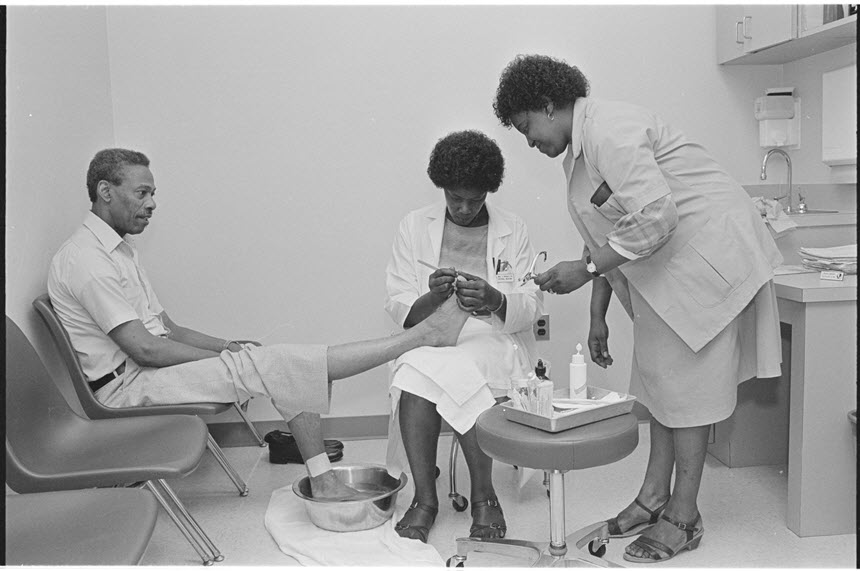Joyce Nichols on:
[Wikipedia]
[Google]
[Amazon]
 Joyce Nichols (born Clayton, June 28, 1940 - July 29, 2012) was an American
Joyce Nichols (born Clayton, June 28, 1940 - July 29, 2012) was an American
Joyce Nichols Rural Health Clinic
Oral historyJoyce Nichols: AAPA Paragon Awards
{{DEFAULTSORT:Nichols, Joyce 1940 births 2012 deaths People from Roxboro, North Carolina African-American nurses American women nurses Duke University people People from Durham, North Carolina 20th-century African-American people 21st-century African-American people 20th-century African-American women 21st-century African-American women
 Joyce Nichols (born Clayton, June 28, 1940 - July 29, 2012) was an American
Joyce Nichols (born Clayton, June 28, 1940 - July 29, 2012) was an American physician assistant
A physician assistant or physician associate (PA) is a type of Mid-level practitioner, mid-level health care provider. In North America PAs may diagnose illnesses, develop and manage treatment plans, prescribe medications, and may serve as a pri ...
(PA). Nichols was the first woman to be certified as a PA, graduating from the Duke University Medical Center program in 1970.
Biography
Nichols was born as Joyce Clayton on June 28, 1940, in Roxboro, North Carolina. and Nichols was married at age 16, though with encouragement from her parents, she finished high school and went onto tobeauty school
Cosmetology (from Greek , ''kosmētikos'', "beautifying"; and , ''-logia'') is the study and application of beauty treatment. Branches of specialty include hairstyling, skin care, cosmetics, manicures/pedicures, non-permanent hair removal such as ...
. Later, she attended Carolina College (later North Carolina Central University) where she made it half-way to a degree in psychology before her finances ran out. In 1965, she received a scholarship to study as a licensed practical nurse
A licensed practical nurse (LPN), in much of the United States and Canada, is a nurse who cares for people who are sick, injured, convalescent, or disabled. In the United States, LPNs work under the direction of physicians, mid-level practitio ...
(LPN) and after graduation in 1966, she started working in the cardiac care unit at Duke Hospital. In the hospital, she learned about the physician's assistant
A physician assistant or physician associate (PA) is a type of mid-level health care provider. In North America PAs may diagnose illnesses, develop and manage treatment plans, prescribe medications, and may serve as a principal healthcare provi ...
(PA) class at the Duke University Medical Center.
The PA Program had been made up strictly of men, especially those with former experience as Navy corpsmen, was reluctant to enroll Nichols. However, she was encouraged to apply by Doctor Eugene Stead, the creator of the PA training program. Nichols was accepted and fought to be given the same stipend as the men in the program. During her training, she still worked in the cardiac unit to support her family. She and her family also lost their house due to a fire in 1969 and the faculty and students at the PA school helped to raise money to help Nichols' family. Nichols graduated from the program in 1970, becoming the first woman to earn a degree as a PA.
When she graduated, she was able to get funds with the help of Doctor E. Harvey Estes Jr., to open a rural, satellite health clinic. She worked in Rougemont and Bahama for two years, providing preventative healthcare to individuals who had not had easy access to medicine in the past. In 1972, she moved to the Lincoln Community Health Center and continued to provide healthcare to rural communities
Sociologists have identified a number of different types of rural communities, which have arisen as a result of changing economic trends within rural regions of industrial nations.
The basic trend seems to be one in which communities are requir ...
. Nichols continued here until her retirement in 1995. After retirement, Nichols stayed involved in her community in various capacities, including raising money for healthcare and volunteering in political campaigns.
Nichols died in her home in Durham, North Carolina
Durham ( ) is a city in the U.S. state of North Carolina and the county seat of Durham County, North Carolina, Durham County. Small portions of the city limits extend into Orange County, North Carolina, Orange County and Wake County, North Carol ...
on July 29, 2012.
References
External links
Joyce Nichols Rural Health Clinic
Oral history
{{DEFAULTSORT:Nichols, Joyce 1940 births 2012 deaths People from Roxboro, North Carolina African-American nurses American women nurses Duke University people People from Durham, North Carolina 20th-century African-American people 21st-century African-American people 20th-century African-American women 21st-century African-American women